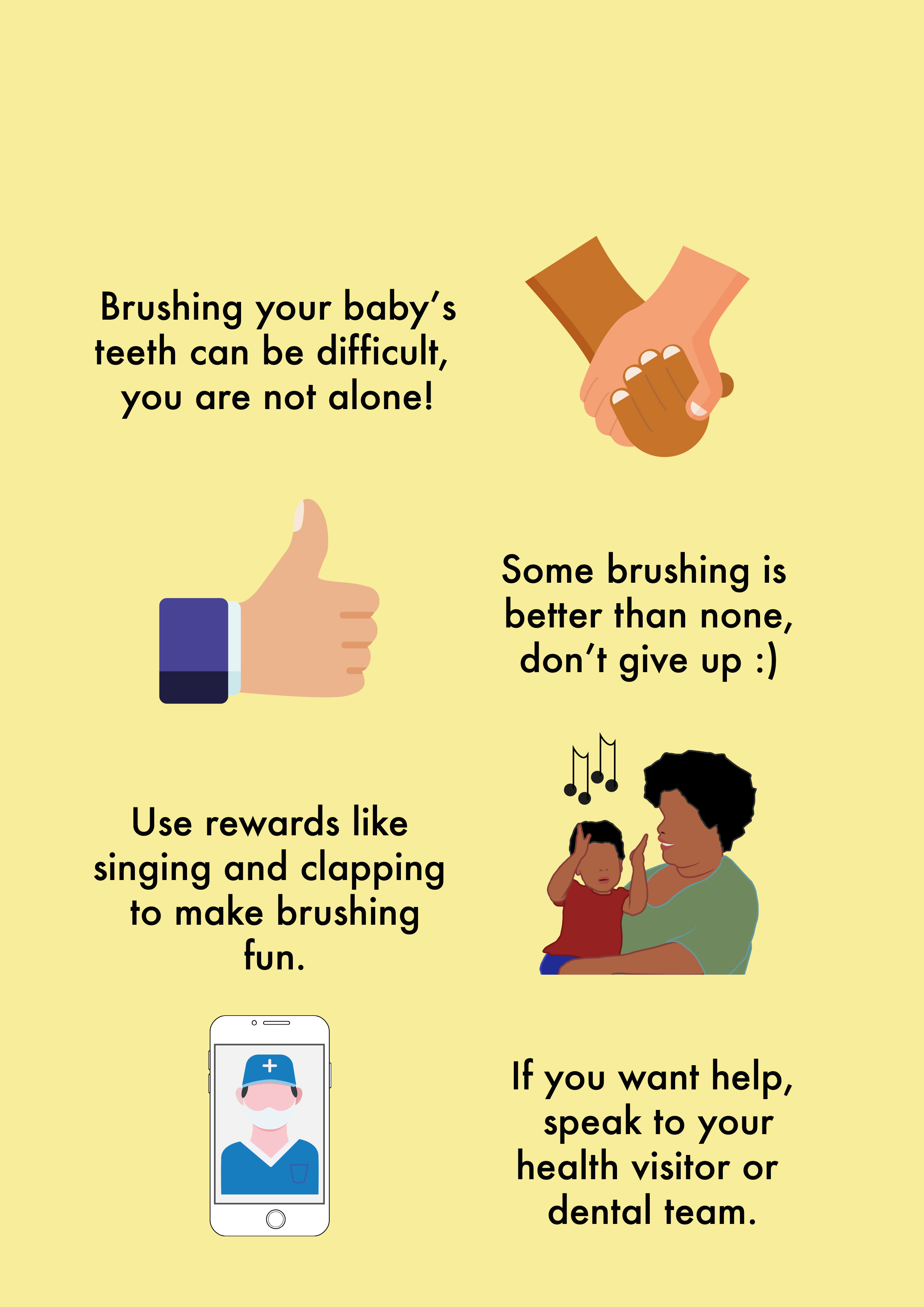Oral Health for Children 3 years and older
Tooth decay is preventable. Follow the tips on this page to keep your child's teeth healthy.
Children's first teeth (baby teeth) are just as important as their adult teeth.
Healthy teeth are important for eating, drinking, talking and smiling.
Baby teeth are important. They guide the adult teeth into the right position. If they are lost early then the spaces for the adult teeth can be lost. The adult teeth may come through crooked.
Tooth decay can cause pain, infection, sleepless nights, time off nursery or school and time off work for parents and carers.
Children often need a general anaesthetic to have decayed teeth removed. Tooth decay is the most common reason for 6 to 10 years olds to be admitted to hospital.
The video below shows how to care for your children's teeth.
Preparing your child for visiting the dentist
NHS dental treatment is free for children under 18 or under 19 and in full time education. Going to the dentist regularly helps the child become familiar with them. It allows the dentist to pick up on any problems as early as possible. Visiting the dentist also means the dentist can paint varnish containing fluoride on children’s teeth to protect them from tooth decay. Children should have a dental check up at least once a year.
- Explain what will happen. You could use dental themed books and videos
- Be positive
- Role play being at the dentist
- Bring toys
- Offer rewards such as stickers (not sweets)
- Bring them to your appointments so they can get used to being at the dentist
- Put your postcode into this website to find a dentist
- Find out who is entitled to free NHS dental treatment
- Contact.org.uk have a guide to oral health and dental care for children with a learning disability, autism or both
- Your child might enjoy this Peppa Pig video, or this Topsy and Tim video
Toothbrushing
 Brush all the surfaces of the teeth and gumline in small circles for 2 minutes, twice a day
Brush all the surfaces of the teeth and gumline in small circles for 2 minutes, twice a day- Brush last thing at night and one other time that fits in with your routine
- For younger children you should sit your child on your lap or stand behing them and cradle their head while you are brushing their teeth
- Spit out the toothpaste and do not rinse! Rinsing washes away the fluoride so it can’t do its job
- Children aged 3 and over should use a pea sized amount of toothpaste containing 1350 to 1500ppm fluoride for maximum protection. Most own brand supermarket toothpastes are ok
- Each family member should have their own toothbrush to stop the spread of germs
- Treat toothpaste like any other medicine and keep it out of reach of children
- Set a good example. Let them see you brushing your teeth
- Brushing your child's teeth can be difficult. You are not alone!
- Brushing with a fluoride toothpaste is more important than good toothbrushing technique!
- Some brushing is better than none, don't give up
- Consider using rewards, games or clapping to make tooth brushing fun or encourage them to brush the teeth of their doll or stuffed toy
Here are links for some helpful videos:
- How to care for the teeth of children aged 3-6 with Dr Ranj and Supertooth!
- How to care for the teeth of children aged 7+ with Dr Ranj and Supertooth!
Other helpful information:
- The Toothbrush Song from Hey Duggee (CBeebies)
- Leeds Smiles website for information on how to take care of your child's teeth, a 2 minute timer song and a tooth brushing game.
- The HABIT website has lots of useful information to help you take care of your child's teeth.
Healthy eating
- Milk and water are the safest drinks for teeth
- Keep sugary foods and drinks to mealtimes only
- Avoid sugary foods and drinks in the hour before bedtime
- If your child needs medicine, ask your local community pharmacist or GP for a sugar free option

Further information
- Visit our healthy eating page for more information
- Sugar: the facts
- Breast feeding and tooth decay: core messages for dental teams and healthcare professionals
- Healthy Eating Right from the Start video (from Henry)
- The Food Scanner app from Change4Life can help you check how much sugar your family is having.



